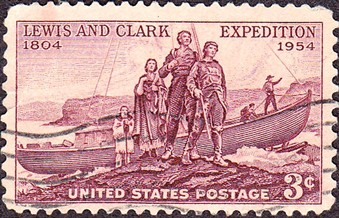Lewis and Clark were surprised to
meet a number of white traders living with, or visiting the Mandan
and Hidatsa tribes on the Knife.
Rene Jessaume
lived with the Mandans and worked for the North West Company as a
free lance trapper and trader. He had lived with the tribe
for fifteen years. Clark described him as "cunning and
insincere."

Hugh McCraken, a
British trader with the North West Company, had just arrived at the
villages from the Assiniboin River, 150 miles to the north.
He was a regular trader and brought manufactured goods to the
villages. Clark wanted to change these trade relationships and
replace them with Americans, but he had to be very careful as the
Indians were loyal to McCracken and Clark was not in a position to
alienate his hosts.
Francois Larocke
and Charles MacKenzie each left journals describing their times
with the Mandan, and with Lewis and Clark. Larocque, a
Frenchman from Quebec, was very politely received and spent a lot
of time with them. It's interesting to note that Lewis told
Larocque that the objective of the expedition was purely scientific
and in no way concerned trade. MacKenzie wrote, "It is true,
Captain Lewis could not make himself agreeable to us...his
inveterate disposition against the British stained, at least in our
eyes, all his eloquence."
Toussaint
Charbonneau, a French Canadian rascal, was 45 years old and had
once worked for the North West Company. He lived among the
Hidatsa with whom he traded goods for his wives, including the
Shoshone girl we know as Sakakawea, who was six moths pregnant when
Lewis and Clark arrived. Bird Woman, as she was called by her
adoptive clan, could communicate to her husband in
Hidatsa. He, in turn, spoke French to Drouillar, another
French trader, who then spoke English to the Americans.
(click here for more on frontier trade)
The Corps of
Discovery built Fort Clark as their winter quarters, but they spent
a great deal of time in the villages. They hunted together,
traded, and shared the same women for sexual pleasure on a regular
basis, a highlight for the Americans who had never known women who
viewed sex as a means of transferring power and fortune from a
stranger to their own husbands. Since the whites were viewed
as very powerful, the young explorers were also 'untiringly
zealous' of obliging the women's requests for sexual favors.
Related People
Related Events
Related Flashpoints